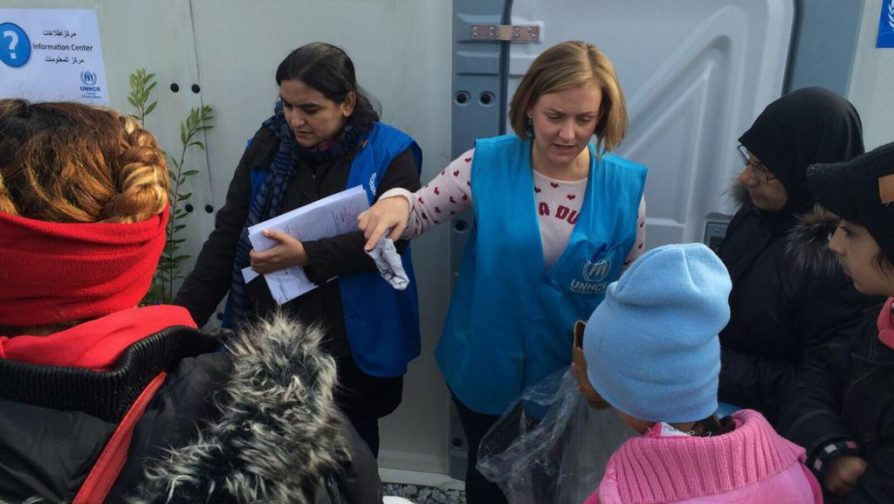Elina Karagiorgi works for UNHCR, the UN Refugee Agency, on the island of Lesvos, in Greece, which currently hosts 6,500 refugees and asylum seekers. As a Senior Protection Assistant, she provides vital support to people forced to flee, including survivors of sexual and gender-based violence. Day in and day out, […]
Elina works tirelessly on a daily basis to provide vital support to persons of concern including victims of sexual and gender-based violence. ©UNHCR/Iro Goutzigou
Elina Karagiorgi works for UNHCR, the UN Refugee Agency, on the island of Lesvos, in Greece, which currently hosts 6,500 refugees and asylum seekers. As a Senior Protection Assistant, she provides vital support to people forced to flee, including survivors of sexual and gender-based violence. Day in and day out, Elina works tirelessly to protect refugees and asylum seekers who have crossed the Aegean Sea.
What is a typical day on the job like for you in Lesvos?
My job is to provide information and counselling to refugees and asylum seekers, including those who have just arrived on Lesvos. Much of my time is devoted to identifying survivors of sexual violence and helping them to access support. We try to assist women who arrive alone and have been assaulted in their country or during their journey, single parent families, and survivors of torture. Our team on Lesvos also works with the Greek authorities to build-up their capacity so they can better support people in need.
What do you do when you meet someone who is a survivor of sexual violence?
We work one-on-one to first see if they are willing to talk with UNHCR. It is extremely important for someone in distress to be able to speak. We reassure them, we tell them about their basic rights and explain what help they can receive on Lesvos and when they leave. Through partners, we provide legal assistance, psychosocial support, and we help them find a safe place to stay.

UNHCR Senior Protection Assistant Elina Karagiorgi, provides support to vulnerable woman in Lesvos, Greece. ©UNHCR/Alexandros Vakalidis
I remember a women we supported, who was tortured in her country and on her journey to Greece. When she arrived, she did not speak and was afraid to look people in the eyes. We started working with her and soon she was participating in daily activities.
One day I went to see her, for the first time she was smiling and wearing brightly coloured clothes. I asked her how she was and she said, “I am very good. I am enjoying gardening.” She had started to speak again and was making friends with the other women staying in her section. Something as seemingly small as gardening was helping her heal. Soon after we were able to transfer her to a UNHCR apartment for vulnerable asylum seekers.
Moria remains very challenging, especially for women, and people can easily fall prey to more abuse. So, women who arrive alone are placed in a section with increased security.
What is the most rewarding part of your job?
When I first started working with survivors of sexual violence, I was hearing all these terrible stories. Many times I just wanted to open the door and leave, I could not even imagine living through their pain.
But, I have learned to focus on the strength that people have. I often ask myself, “How will they be able to recover?” and yet they do. Witnessing their transformation, seeing them regain dignity and control over their lives, that gives me hope and helps me do my job.
Share on Facebook Share on Twitter